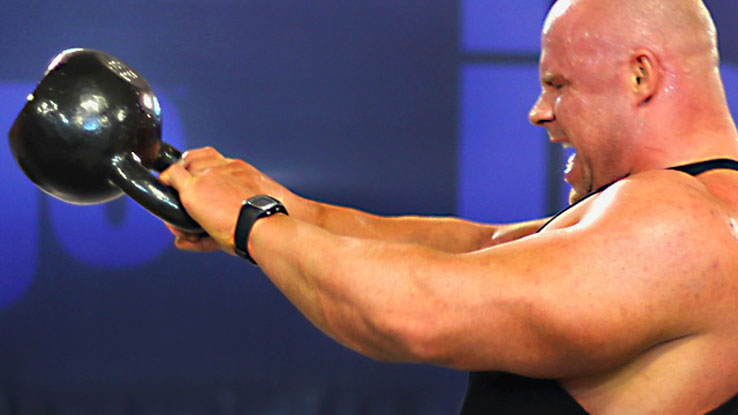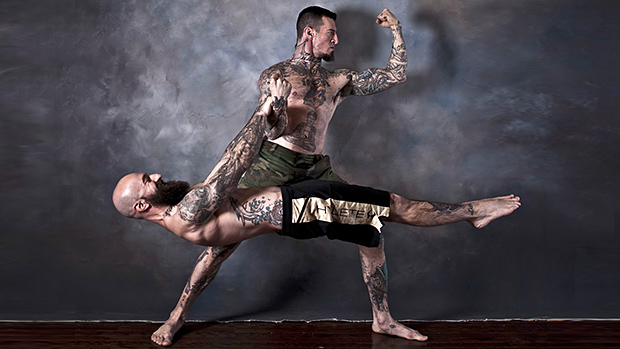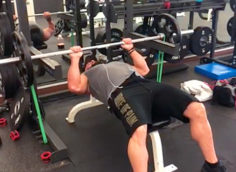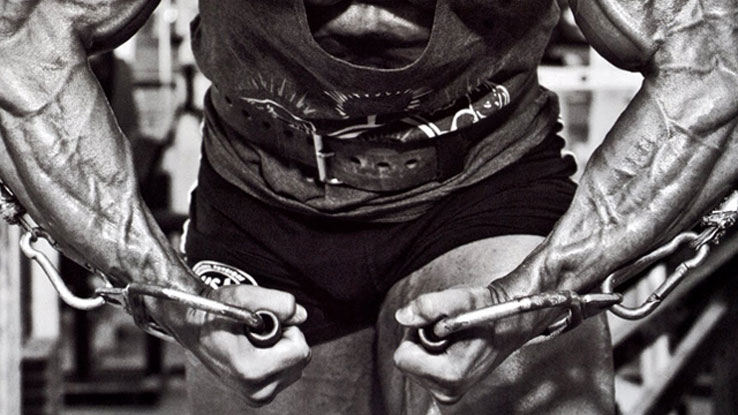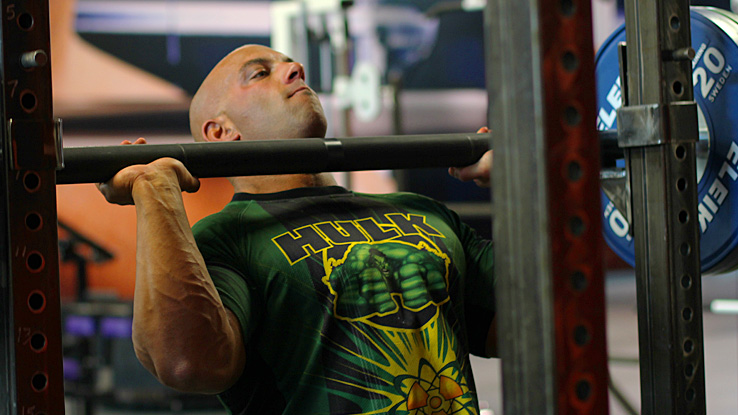Here's what you need to know...
- While kettlebell swings are great for fat loss and conditioning, they're underutilized for building strength and explosiveness.
- Very heavy kettlebell swings have many of the same benefits as the deadlift, the Olympic lifts, and plyometrics.
- If you can ignore the high-rep CrossFitters and perfect-form zealots and swing two and a half times your body weight, you will be unstoppable.
If there's one thing that grinds my gears it's the notion that a kettlebell swing is just a cardio exercise and should only be done with light weight. This stems from a total lack of understanding of what a kettlebell swing can or should be. It's time to ditch the sissy swings and use them to turn human bodies into unstoppable smashing machines.
If you look at the positions, the kettlebell swing is not unlike a deadlift. The fact is, when performed correctly, they're identical except for the position of the weight.
At the bottom of the movement, the shins are near vertical, the spine is long, and the shoulders are set down and back. At the top, hips and knees extend and you're standing upright.
As for the movement in action, the kettlebell swing is decidedly simple: explode from bottom position to top position – simple as that.
Bret Contreras gave a pretty good rundown on "heavy" kettlebell swings. If you haven't read it, I suggest you do so.
Training for power is all the rage. Even everyday gym rats are figuring out that training explosively can yield tremendous improvements in both strength and physique development.
The Olympic lifts are fantastic for building explosive power but can take many hours of dedicated practice to be performed safely, and even more hours if you're looking to be competent.
Now I love power snatches, but I also live in the real world. Many people don't have the time, patience, or flexibility to do the Olympic lifts well. If you have the time and the desire, it's certainly a worthy investment, but if you'd rather just build explosive power in the easiest way possible, then heavy swings are for you.
To that end, here are the ways I use heavy swings in a session:
- For strength and/or power: 5-10 reps.
- For conditioning: 10+ reps for many sets, or 25+ reps for a few sets.
What you don't see is any of this in-between crap. It's like what Yoda says – do or do not. Make it heavy and powerful or do something else.
The really cool part about the heavy swing is that you not only get the same benefits as the deadlift, but you also get a killer eccentric and true plyometric action at the bottom of the swing.
What's a plyometric? It's another (often bastardized) fitness modality that's all the rage today. It involves repeated rapid stretching and contracting of muscles – often by jumping and rebounding – to increase muscle power.
"Hey, I do plyometrics, I do box jumps all the time..."
Uh, no you don't. You're jumping on a box. It looks cute, it might even be fun, but that ain't plyometrics, son.
That bottom position of the heavy swing is actually a plyometric. So score one more benefit for the swing over the Olympic lifts.
A heavy swing is trying to make you face-plant into the floor. The ballistic momentum of the weight coming down is force that your body must resist, stop, and return in equal amounts. I hope someone will measure the force at the bottom of a 500-pound swing someday, but for now, rest assured that it's a lot.
All that sounds good so far, right? Again, the problem with swings is the stigma associated with them in the general population.
Weak, fragile people think they're scary and dangerous. Strong people think they're a waste of time, more appropriate for a bootcamp class.
Crossfitters only use them for high-reps swung overhead – they might as well do cardio-kickboxing. Christian Thibaudeau notes that Crossfitters only do it this way so the rep can be officially counted as part of a competition or WOD; however, it's a silly way to swing that ruins many of the benefits.
Then you have the perfect-form zealots, who have a conniption every time you do anything over 30% of maximum. God forbid you do a swing where the angle between your thighs and trunk isn't exactly 90 degrees. Just shut up, put your protractors away, and swing something heavy.
My job is to prove that swings are well worth the time, if you man up. Check out the swing below – it's me having a go with 465 pounds.
You're looking at a swing of two and a half times body weight. Of course, they don't make kettlebells that heavy. Regardless, it's time we rethink the word "heavy" when it comes to kettlebell swings.
Here's your challenge. Ask yourself, wouldn't I get a hell of a lot stronger and more explosive if I was capable of swinging more than double my bodyweight?
It doesn't even have to be that heavy. Truth be told, the above video is on the higher end of what I'd normally do. You could still benefit if you were "only" swinging around 350 pounds, although that's still a lot more than even the typical "heavy" kettlebell swing.
Can you see that maybe having that kind power and explosiveness would benefit both your pulling prowess and your posterior chain development?
So please, ditch the light swings and infinite number of reps and give very heavy swings a try. Your hips, mid-back, traps, and forearms will collectively thank you the next day in that special way thoroughly trashed muscles always do.
Not to mention, if even one lifter switches from wimpy swings to manly swings, it's a win for humanity.

